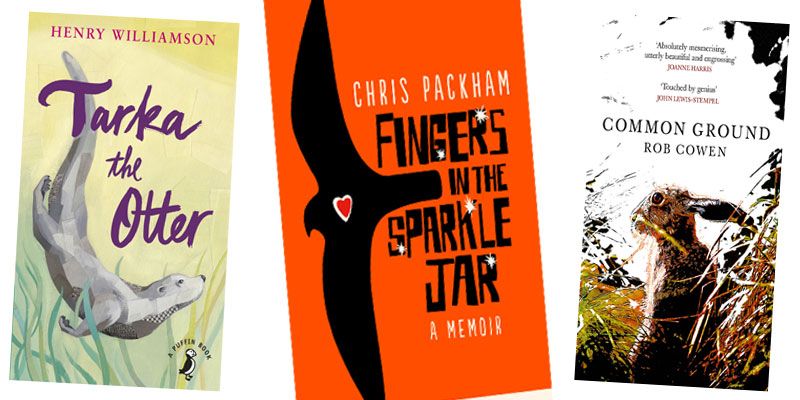
Chris Packham's book Fingers in the Sparkle Jar has been voted the UK’s favourite piece of nature writing in an online poll organised as part of a research project led by the University of Leeds.
In second place was the classic Tarka the Otter by Henry Williamson, and in third, Common Ground by University of Leeds History of Art alumnus Rob Cowen.
The poll was organised by the Arts and Humanities Research Council (AHRC) to help launch Land Lines, a two-year research project it is funding, and the result announced on Winterwatch on BBC2 this evening.
A partnership between the Universities of Leeds, St Andrews and Sussex, the project is examining the history of modern nature writing from 1789, when Gilbert White’s The Natural History of Selborne was first published, to the present day.
In total, 7,300 votes were cast by the public in a national online poll featuring 10 shortlisted books. Also on the final shortlist were:
- The Peregrine by JA Baker
- Poems by John Clare
- The Wind in the Willows by Kenneth Grahame
- Findings by Kathleen Jamie
- The Lost Words by Robert Macfarlane and Jackie Morris
- The Living Mountain by Nan Shepherd
- The Natural History of Selborne by Gilbert White
These were selected by a panel of experts from 278 titles nominated by the public last year.
“Research on the ways the environment is represented is helping us better understand the cultural value of the environment, the role it plays in societal wellbeing and how communities are engaging with narratives about environmental change.”
Dr Pippa Marland, Research Fellow in the School of English at Leeds, said: "The Land Lines team would like to congratulate Chris Packham wholeheartedly on his well-deserved win. Fingers in the Sparkle Jar is an outstanding book: raw and brave, and written with an astonishing vividness of perception and recall.
"With this memoir Chris has succeeded in attracting readers who would perhaps not usually pick up a ‘nature book’. Informative and heart-breaking in equal measure, and graced with a punk sensibility and wry sense of humour, Fingers in the Sparkle Jar is a work of great originality which pushes at the boundaries of the nature writing genre."
She added: "We’re delighted that Henry Williamson’s classic animal narrative Tarka the Otter has kept its place in readers’ hearts. We were also interested to see that two of the top three titles were published in the last three years. This is a testament to the current widespread popularity of nature writing.
"Both Chris Packham and Rob Cowen’s books feature the environs of urban areas, and celebrate the nature that exists on our doorsteps, and while they adopt the combination of memoir and observation typical of non-fiction nature writing, they also introduce new elements to the mix."
Gary Grubb, Associate Director of Programmes at the Arts and Humanities Research Council, said: "Research on the ways the environment is represented through art, media and literature, including the Land Lines project, is helping us to better understand the cultural value of the natural environment, the role that it plays in societal wellbeing and how communities are engaging with narratives about environmental change."
Public comments about Fingers in the Sparkle Jar included:
"It's the most powerful, honest account I've ever read about how nature can shape a person and how interactions with wildlife can stay with someone for ever. It's beautifully written and the messages and story stayed with me long after I turned the last page."
"Fingers in the Sparkle Jar is a truly beautiful, honest account of growing up with Asperger’s and in love with nature, when everyone around you wasn't. It's brutal and hard to read at times but ultimately brilliant. And very well written! I couldn't put it down."
Public Comments about Tarka the Otter included:
"Ever since my dad got his dusty old copy from his childhood out of the loft one Christmas while we were looking for the tree, I have always loved this book, with its rich earthy tale."
"I read it as a small boy and it opened my eyes to the beauty and savagery of what we call nature. Beautifully and unsentimentally written, it also had memorable illustrations by Charles Tunnicliffe. It's the book that fired up my lifelong interest in wildlife and the world around us."
Public comments about Common Ground included:
"It perfectly and poetically describes a very special habitat - one man's exploration of a wild environment on his very doorstep on the edge of town. My favourite book about my favourite place."
"It's down-to-earth in the most perfect sense. Grounded, rooted, and relates to us all as town-dwellers. But it opens us up to the natural world outside our town and city limits. Revelatory. Inspiring."
Further information
For further details, contact:
Gareth Dant in the University of Leeds press office on +44 (0)113 343 3996 or g.j.dant@leeds.ac.uk
Toby Shergold, at the Arts and Humanities Research Council, on +44 (0)1793 416082 or t.shergold@ahrc.ac.uk
Selection panel – The panel members who selected the final 10 titles, were: Mike Collins, Arts and Humanities Research Council; Miriam Darlington, nature writer and lecturer at the University of Plymouth; Naomi Fuller from Avon Wildlife Trust; Ben Hoare, Features Editor at BBC Wildlife Magazine; Professor Graham Huggan, Principal Investigator of the Land Lines project at the University of Leeds.
Land Lines – Modern British Nature Writing 1789-2014 Research organisations involved: University of Leeds School of English (Lead research organisation), University of Sussex and University of St Andrews. Funded by the Arts and Humanities Research Council. www.landlinesproject.wordpress.com or email: LandLines@leeds.ac.uk Twitter: @LandLinesNature or Facebook: www.facebook.com/LandLinesNature